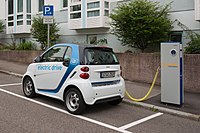Plug-in electric vehicles in New Zealand



The initial adoption of plug-in electric vehicles in New Zealand was supported by New Zealand Government policies, including monetary incentives such as electric vehicle discounts, exemptions from road user charges, and electric vehicle sales targets.[2][3][4][5] By 2023 year-end[update], there were 106,942 registered plug-in electric vehicles in New Zealand, consisting of 76,550 battery-electric vehicles (BEV) and 30,392 plug-in hybrid vehicles (PHEV), together making up 2.2% of the national fleet of 4.8 million vehicles.[6] In 2023, 27.2 percent of all new car registrations were plug-in electric vehicles.[7]
Government incentives
[edit]The National-led government launched an Electric Vehicle Programme in May 2016 to encourage EV uptake.[8] Electric vehicles in New Zealand were exempt from road user charges (RUC) from 2009 until 1 April 2024; RUC now apply at NZD $76 per 1000 km unit for BEVs, and $38 per 1000 km for PHEVs.[9][10] EV owners were initially able to access bus lanes and preferential parking,[4] but this was dropped after local authority bus operators and the general public raised concerns about public transport disruption. There are subsidies available for the installation of public EV chargers.[11] New Zealand also proposed a "cash for clunkers" scheme, incentivising low-income drivers to trade their petrol or diesel cars for a discounted electric vehicle, but this scheme was abandoned in March 2023.[12][13]
In July 2019, the government proposed a Clean Car Discount of up to NZD $8,000 on purchases of new zero-emissions vehicles, and a charge of up to $3,000 for new vehicles that emit more than 250g of carbon dioxide per kilometre.[4] The Clean Car Discount was in effect from July 2021 to December 2023, with a used EV being subsidised up to $3,450 and a used PHEV up to $2,300.[11] This scheme was ended by the newly elected government on 31 December 2023.[14]
In 2022 the Government enacted a Clean Car Standard that would phase-in a stepped reduction in the average emissions of most new and used imported passenger vehicles to 145 grams per kilometre travelled in 2023, dropping to 63.3g/km in 2027, with financial penalties if the targets are not met.[15] These targets would ensure New Zealand cleans the entire car fleet by 2027 and both achieves and surpasses the European Union's fuel efficiency targets.[15] As well as setting CO2 targets, the Clean Vehicles Act passed in February 2022 also imposed charges on the purchase of high CO2 emission cars, which will accelerate electric vehicle adoption.[16]
In 2021 the government set a target for 50% of all light vehicle registrations by 2029 to be electric vehicles, and 100% by 2035.[17] The New Zealand Government will ban the sale and importation of petrol and diesel vehicles between 2035 and 2040.[18][19][17] This is despite the Climate Change Commission recommending banning petrol and diesel cars by 2032.[17] Higher parking fees, congestion charges and road pricing were also considered to increase EV adoption.[19]
Charging infrastructure
[edit]

As of June 2023[update], there are over 315 electric vehicle DC chargers across New Zealand at over 275 locations.[20] Type 2 CCS and CHAdeMO are the standard connections for DC chargers in New Zealand; the former is mainly used by New Zealand-new vehicles while the latter is mainly used by used Japanese imports. As of December 2023[update], around 67% of registered battery electric vehicles use the Type 2 CCS standard, while 33% use the CHAdeMO standard.[21][22]
In April 2017, Waka Kotahi NZ Transport Agency set a vision of at least one rapid DC charger every 75 km (47 mi) across the state highway network. As of June 2023[update], this is largely complete with some gaps in low-traffic and hard-to-reticulate areas: State Highway 43, State Highway 63, State Highway 7 over Lewis Pass, State Highway 6 over Haast Pass, and State Highway 94 to Milford Sound.[23]
Sales
[edit]By the end of 2023, New Zealand electric vehicle registrations reached 27.2% of new car sales.[7] This was an increase from electric vehicles representing 6.45% of new car sales at the beginning of the clean car subsidy programme in July 2021.[2]
While sales of new electric vehicles have increased, the New Zealand EV fleet is dominated by second-hand Nissan Leafs imported from Japan. In December 2023 there were 23,067 registered Leafs, accounting for about 30 percent of all BEVs on New Zealand roads.[24] About 95 percent of these were imported second-hand from Japan, a similarly left-hand traffic country, and a major source for New Zealand's second-hand car market. Japan's comparatively slow adoption of EVs, the Leaf being the only notable contribution before 2020, has strongly shaped adoption of EVs in New Zealand.[25] Cheap second-hand Leaf imports from Japan proved so popular that Nissan didn't offer the Leaf as a new vehicle in New Zealand between 2016 and 2019, citing price pressure from importers and second-hand dealers.[26]
In 2020 there were more EVs in New Zealand than in Australia, despite Australia having five times the population.[5] By July 2023, Australia had overtaken New Zealand with a total fleet of about 130,000 EVs.[27] 26,000 EVs were registered in New Zealand in 2020, and the government planned to have an additional 60,000 electric vehicles on New Zealand roads by 2023.[5] However, in 2019, New Zealand planned to have 64,000 electric vehicles in the country by 2021 when it was projected New Zealand would reach 100% electric vehicle sales by 2030.[3] In 2021, New Zealand planned to lead Asia by targeting 30,000 EVs to be sold in 2025, and to have the highest EV market share of new car sales by 2029.[4] A target was also set for the light vehicle fleet to be 30% electric by 2035.[12]
Statistics
[edit]| Type | 2013 | 2014 | 2015 | 2016 | 2017 | 2018 | 2019 | 2020 | 2021 | 2022 | 2023 |
|---|---|---|---|---|---|---|---|---|---|---|---|
| New PHEVs | 11 | 224 | 451 | 779 | 1,199 | 1,939 | 2,880 | 3,640 | 6,114 | 13,393 | 22,313 |
| New BEVs | 100 | 139 | 206 | 581 | 1,263 | 2,004 | 3,861 | 5,412 | 12,177 | 28,099 | 52,283 |
| Used PHEVs | 0 | 2 | 15 | 116 | 456 | 897 | 1,544 | 2,222 | 3,292 | 5,219 | 8,074 |
| Used BEVs | 54 | 125 | 321 | 1,013 | 3,227 | 6,799 | 10,241 | 12,608 | 15,298 | 18,976 | 23,586 |
| Total EVs | 165 | 490 | 993 | 2,489 | 6,145 | 11,639 | 18,526 | 23,882 | 36,881 | 65,687 | 106,247 |
References
[edit]- ^ Hansen, Matthew (17 January 2024). "From BYD to Tesla: NZ's 10 best-selling electric cars of 2023 revealed". Stuff. Archived from the original on 19 January 2024. Retrieved 19 January 2024.
January 17, 2024
- ^ a b "New Zealand marks 5,850 EV sales so far in 2021". electrive.com. 4 August 2021. Archived from the original on 19 October 2021. Retrieved 19 October 2021.
- ^ a b Parkinson, Giles (12 April 2019). "New Zealand tipped to reach 100% electric vehicle sales by 2030". The Driven. Archived from the original on 12 May 2021. Retrieved 12 May 2021.
- ^ a b c d "New Zealand's EV Market Gets A Boost With New Government Directive". REGlobal. 14 January 2021. Archived from the original on 19 October 2021. Retrieved 19 October 2021.
- ^ a b c Fernyhough, James (6 May 2021). "Siemens signs deal to bring EV charging equipment to New Zealand". The Driven. Archived from the original on 6 May 2021. Retrieved 6 May 2021.
- ^ a b "Fleet Statistics". Ministry of Transport. Archived from the original on 26 December 2023. Retrieved 10 January 2024.
- ^ a b Foster, James (16 January 2024). "NZ EV Market Share: New Cars". EVDB.nz. Archived from the original on 10 January 2024. Retrieved 19 January 2024.
- ^ "Electric Vehicles". Ministry of Transport New Zealand. 3 October 2016. Archived from the original on 12 October 2016. Retrieved 3 October 2016.
- ^ "Electric Vehicles Programme". New Zealand: Ministry of Transport. Archived from the original on 30 December 2021. Retrieved 31 December 2021.
- ^ "RUC for electric vehicles". New Zealand: Waka Kotahi NZ Transport Agency. Archived from the original on 26 January 2024. Retrieved 8 February 2024.
- ^ a b Keall, Chris (5 October 2021). "Record September for NZ new vehicle sales – and 1 in 5 is electric". New Zealand Herald. Archived from the original on 19 October 2021. Retrieved 19 October 2021.
- ^ a b Vorrath, Sophie (14 October 2021). "New Zealand flags "cash for clunkers" scheme to drive shift to EVs". The Driven. Archived from the original on 19 October 2021. Retrieved 19 October 2021.
- ^ McClure, Tess (13 March 2023). "New Zealand scraps transport emissions reform to fund welfare increase". The Guardian. Archived from the original on 25 October 2023. Retrieved 8 February 2024.
- ^ Edwards, Richard (13 December 2023). "Details of Clean Car Discount cancellation". EVs & Beyond. Auto Media Group. Archived from the original on 14 December 2023. Retrieved 10 January 2024.
- ^ a b "NZ should be a 'fast follower' reducing car emissions, says Ford boss". Stuff. 12 November 2021. Archived from the original on 13 November 2021. Retrieved 13 November 2021.
- ^ "Clean Cars | Ministry of Transport". www.transport.govt.nz. Archived from the original on 30 December 2021. Retrieved 31 December 2021.
- ^ a b c "New Zealand unveils $8,600 subsidy for electric vehicles to reduce emissions". the Guardian. 14 June 2021. Archived from the original on 26 October 2021. Retrieved 22 October 2021.
- ^ "Cop26: carmakers agree to end sale of fossil fuel vehicles by 2040". the Guardian. 10 November 2021. Archived from the original on 23 November 2021. Retrieved 13 November 2021.
- ^ a b Niall, Todd (14 May 2021). "Government could ban fuel-burning cars by 2050, with imports ending 2035". Stuff. Archived from the original on 22 October 2021. Retrieved 22 October 2021.
- ^ EECA. "New Zealand Public EV Charger Map". EECA. Archived from the original on 13 June 2023. Retrieved 13 June 2023.
- ^ "Charging point connectors and socket outlets | Waka Kotahi NZ Transport Agency". www.nzta.govt.nz. Archived from the original on 11 July 2022. Retrieved 13 June 2023.
- ^ EVDB (10 December 2022). "NZ EV Market Share: Light Vehicles". EVDB. Archived from the original on 23 September 2023. Retrieved 19 January 2024.
- ^ "Enabling a nationwide network of public EV charging infrastructure | Waka Kotahi NZ Transport Agency". nzta.govt.nz. Archived from the original on 3 June 2023. Retrieved 15 June 2023.
- ^ Foster, James (16 January 2024). "Most Popular EVs in New Zealand". EVDB.nz. Archived from the original on 19 January 2024. Retrieved 19 January 2024. See table under "Units Registered All Time", sort by the "Total" column
- ^ Cooke, Henry (14 April 2023). "Is driving on the left stopping New Zealand reaching its climate goals?". The Guardian. Archived from the original on 20 January 2024. Retrieved 20 January 2024.
- ^ Bosselman, Richard (28 February 2018). "LEAF sales challenge unchanged". Motoring NZ. Archived from the original on 20 January 2024. Retrieved 20 January 2024.
- ^ Thompson, Natalie (July 2023). "State of Electric Vehicles Report 2023". Australia: Electric Vehicle Council. Retrieved 9 February 2024.

